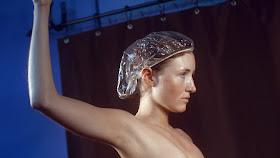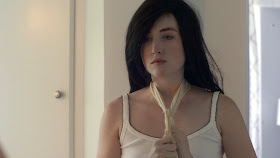What was she doing and why was she doing it are two of the questions provoked by the new quasi-documentary, quasi-narrative, quasi-intelligent examination of an actual 1974 on-air suicide by a TV talk show host that took place in Florida. Robert Greene's film KATE PLAYS CHRISTINE strikes me as an almost perfect example of what I'd call a relatively new and very narrow genre subset: the Aren't we-clever Brooklyn movie. This is probably not fair to Brooklyn or movies in general, but so be it. The film tackles the distressing subject of suicide and how to examine this from an honest POV, but then bangs you over the head with its "findings," even as it very nearly bores you to death in the process. (I am told that nobody in the film actually lives in Brooklyn, including its director. But the film reminds me of Bklyn at its most pretentious.)
Mr. Greene, pictured at left, gave us the 2014 documentary Actress, another overpraised film that TrustMovies expected to cover but had to refrain from doing so because, at the press screening I attended, the film's start was delayed so long, due to having to wait for the critic from (I believe) The New York Times. So I had to leave ten minutes before the finale in order to arrive on time for my next screening. One does not fairly review a movie one hasn't seen the whole of, but from what I did see of Actress, I found both the subject and the film made around her much less interesting than did the filmmaker.
So it is again with Kate Plays Christine, in which actress Kate Lyn Sheil (above) -- whom I've enjoyed to a point in a few other films, and in the Netflix series House of Cards -- both plays and investigates the history and personality of that TV host, Christine Chubbuck (shown below). The film's credits list Mr Greene as its writer, and that would seem to include much of the dialog placed in the mouth of Ms Sheil, who did not seem, to me at least, to always be improvising or even creating her own in-the-moment dialog. This may be because Greene is on record as saying that, as concerns documentaries, "The only way to get the the truth is layering constructed truths and leaving them unresolved." Which seems to be what he has done here. Oh, yes: It is all very self-reflectively "meta" -- but more Metamucil than anything else.
His movie is a mix of would-be investigation -- interviews with folk who knew and/or worked with Ms Chubbuck) and narrative scenes in which Greene uses actors to dramatize important scenes and moments in the life just-before-her-death of the talk show host. Except that, for all I know, Greene may have also used actors to portray some of those supposedly real-life folk who are interviewed. It's that kind of movie.
In addition, most of these scenes -- whether they are "documentary" or "narrative" -- are barely adequately (sometime not nearly that) handled. Ms Sheil, who in the main performer in the film, is not a particularly riveting actress. Whether she is speaking to us in the same dreary, droning voice in the "doc" portions, or "acting" in the narrative sections, she is, well... less than commanding. But I would tend to blame this more on Greene than on the actress. (We shall see what Rebecca Hall does with the same role in the full-out narrative drama, Christine, scheduled for release this October.)
The doc occasionally does come to life, as when Kate interviews an elderly white-haired-but-very-tanned newscaster who tells her that Christine's suicide was meaningless, useless and did not accomplish a thing. This angry, controlling and cold-as-dry-ice fellow would seem to represent the perfect Florida Republican member of the Chamber of Commerce, dedicated to corporate power and greed -- and the scene whips the movie into high gear for a short time.
We watch as Kate transforms (sort of) into Christine by doing some slightly-Stanislavski Actor Prepares business, then getting brown contacts to cover her blue eyes (above), being sprayed with a fake tan (below) and often talking about her debut to the subject of the documentary: "I want to pay respect to Christine Chubbuck and empathize with her, which of course I do." For his part, Mr Greene is on record as saying that making this movie has illustrated the risks of pointing a camera at any subject. I would think he'd have understood that point several movies ago.
The documentary is exploratory to some extent, but the slowness of its pacing, together with the sameness of so much of the content becomes deadening. In the article in this past Sunday's New York Times Art & Leisure section, the filmmaker notes that he wants the film to actually cave in on itself, under the weight of the questions it asks. "It has to fall apart to work." Greene certainly has achieved the falling-apart part. His film does not work as documentary, as narrative, nor as anything else except perhaps as a trying, tiring exercise. The film's ending would seem to want to implicate us viewers -- but succeeds in implicating the filmmaker and his star instead.
From Grasshopper Film and running a rather lengthy hour-and-52-minutes, Kate Plays Christine opens tomorrow in New York City at the IFC Center and then on September 16 in the Los Angeles area at Laemmle's Noho 7. Elsewhere? A few cities are on the docket. Click here then scroll all the way down to click on Where to Watch.









No comments:
Post a Comment